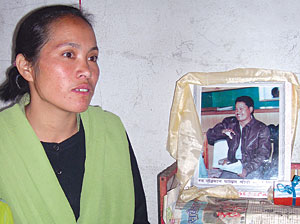 BOTH VICTIMS: Maoist CA member Devi Khadka was tortured and raped in police custody during the war. |
Few will disagree that big strides have been taken in the peace process by isolating the guns from the gunners. Yet, a state of impunity and absence of justice, intrudes upon the families of the victims. The fa�ade of 'peace' has reduced the sacrifice of thousands who died or were simply 'lost' to bargaining chips.
Nepal's peace process today is defined solely in terms of the management of some 19,000 combatants and their uncertain futures. The de-humanisation of the process to a mere technicality eludes the complexity of the case. How will the state reconcile an ex-combatant, involved in abduction, torture or execution of an individual, with members of the family? How will it address the trauma of combatants and the families who have witnessed unspeakable violence? How will the state ensure reconciliation between the Nepal Army and its civilian victims?
The fact that draft bills to form commissions to look into cases of disappearances and on truth and reconciliation, has been stuck in the legislative parliament for the last four years is a proof that successive governments want to sweep the dirty past under the rug.
The public does not have much faith in commissions, anyway. Countless committees have been set up and reports submitted, but none were ever made public or acted upon. There is a real danger that the failure to address the graveness of the injustice done and lack of political courage to uncover the truth may permanently fracture Nepali society.
 But UML CA member Shanti Pakhrin believes Khadka ordered her husband's execution. Both run into each other every day in the CA where two bills to set up commissions on disappearances and transitional justice are being debated. |
Both warring sides are in the administration. Yet the healing has to start with the airing of the truth. Even inside the CA chambers, UML member Shanti Pakhrin keeps running into Maoist member Devi Khadka, who Pakhrin believes ordered her husband's execution but has never got a satisfactory answer as to why. Devi Khadka herself was a victim of torture and rape in police custody. How can both come to terms with the truth of the past, what can the state do to help them both?
These questions need serious debate among stakeholders of the peace process, particularly the major political parties. Holding the nation and constitution-writing hostage to the peace process would have made sense if the effort was genuinely geared towards addressing both manifested as well as latent conflict.
Agreement on numbers and a package deal may finally empty the cantonments and who knows, even give us a new constitution in near future. But if we keep mistaking silence for peace, who are we fooling?
Read also:
Forgotten futures, RAM KUMAR BHANDARI
The focus on the constitution has taken attention away from the plight of the families of the disappeared



